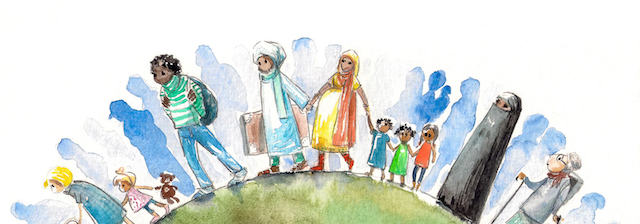The Cultural Pluralism Area of the Global Governance Programme runs several Massive Open Online Courses (MOOCs) in partnership with Future Learn, the Social Learning Platform launched by the Open University UK in 2012.
MOOC is an acronym that stands for ‘Massive Open Online Course’. It is a university course offered online and available for free to everyone who has access to the Internet.
The latest courses we offer are:
- Governing Religion: Global Challenges and Comparative Approaches
- Religion, Radicalisation, Resilience
- Interfaith Dialogue for Combating Extremism among Young People
- Culture in the Digital Age
Our online programme on Exploring Culture and Heritage includes four different courses on:
Our Migration Courses include:
- Why Do People Migrate? – Part 1- Facts
- Why Do People Migrate? – Part 2 – Theories
- Migration and Cities
Interfaith Dialogue for Combating Extremism among Young People
Learn how interfaith dialogue builds resilience to the influences of extremism
On this course, you’ll be introduced to interfaith and learn how to implement interfaith initiatives to encourage understanding between faiths and communities. You’ll uncover radicalisation and extremism and learn how interfaith can contribute to resilience, which you’ll discover is key when responding to violence and polarisation. You’ll also explore the practical challenges of conducting interfaith actions and dialogue, and use your experience to develop your own approach to dealing with issues that support the spreading of extremist ideas.
Governing Religion: Global Challenges and Comparative Approaches
By Anna Triandafyllidou and Tina Magazzini
On this course you will consider different models of state-religion relations, reviewing examples from both European and non-European countries.
You will learn how different models have emerged out of historical processes of nation formation (including post-colonial independence, redrawing of state boundaries after a major political transition or through an evolutionary process of institutional and value change).
You will also consider your own experiences, and debate ideal models for governing religion and religious diversity in today’s world.
Religion, Radicalisation, Resilience
By Anna Triandafyllidou and Tina Magazzini
Through this course you will explore issues related to radicalisation and religious violence, learning how to build resilience within communities and schools.
You will examine terrorist events and their consequences but the stories of the perpetrators. You will hear from key experts seeking to explain how people were driven to become radicalised and engage in terrorist violence. You will consider the definition of radicalisation and what forms it takes. You will then get basic training in how to develop a community resilience programme against radicalisation and terrorism.

Culture in the Digital Age
By Anna Triandafyllidou and Jérémie Molho
In the last two decades, the cultural sector has undergone a radical transformation due to the rise of new media technologies. The digital revolution has radically transformed the daily practice of international cultural relations.
On this course you will explore how digital technology creates new opportunities in international cultural relations. You will learn about new trends in the cultural economy, regulatory challenges and emerging threats. You will also be introduced to tools to build a digital strategy in order to reach an international audience and establish global networks.
Migration And Cities
By Anna Triandafyllidou and Nick Dines
Migration has always played a fundamental role in urban development. Without some form of inward migration – be it international or internal – cities would not develop or grow.
On this course you will explore the relationship between migration and cities both across history and in the world today. For example, you’ll learn about the influence of migration on the rise of modern, industrial cities in the nineteenth and twentieth centuries. You will also look at a range of contemporary issues at the urban scale, such as employment, settlement, public space and local policy.
Cultural Diplomacy
By Anna Triandafyllidou and Jérémie Molho
What does cultural diplomacy mean? How does it work in practice? What effect does it have in today’s world? Get the answers with this introduction to cultural diplomacy.
You will explore whether cultural diplomacy is about intercultural dialogue and engagement between different countries or whether it could be understood as one type of public diplomacy. You will consider the role of state actors and international organisations as well as that of non-state actors (including types of cultural and educational institutions). You will also consider the emerging EU strategy of cultural diplomacy.
Cultural Heritage and the City
By Anna Triandafyllidou and Jérémie Molho
Cultural heritage is usually discussed in national or religious terms: we speak of Italian culture, Greek civilisation, Islamic art, and so on. But today cities are creating their own heritage through museums, galleries, markets of artistic goods, and urban networks. Cities project themselves as cultural hubs representing and connecting entire regions, for example Doha and the UAE, Singapore and Southeast Asia, Los Angeles and North America.
Using these and other examples, through this course you’ll explore exactly what is meant by urban cultural heritage and key concepts related to it.
Cultures and Identities in Europe
By Anna Triandafyllidou and Jérémie Molho
What is European identity? What do we understand and promote as European culture? On this course you will answer these questions and others as you critically consider the formation of diverse identities and cultures in Europe. You will explore fundamental European policies on culture, creativity and the media, and shed light on the importance of memories and shared heritage. You will also look at the policy behind European cultural and media industries and question current approaches to cultural creativity that rely heavily on economics.
Why Do People Migrate? – Facts (Not offered currently)
By Anna Triandafyllidou and Nick Dines
Migration often makes headlines; it’s become a key issue of politicians worldwide. But what is the reality of migration? This course will introduce you to key challenges of irregular migration and asylum seeking worldwide. You’ll look at key cases from around the globe, including asylum seekers arriving in Europe via the Mediterranean and Syrian refugees in Turkey, Central American labour migration to the USA and the Rohingya refugee challenge in Southeast Asia.
Why Do People Migrate? – Theories
By Anna Triandafyllidou and Nick Dines
In the second course, you will learn about different theoretical models that seek to explain why migration starts and why it continues. You will explore migration as a structural feature of our societies and examine individual’s choices to migrate. You will consider the role networks and institutions play in the movement of people. You will also hear from international experts about how migration theories can help us understand cases of labour migration in different world regions.

Cultural Diversity and the City
By Anna Triandafyllidou and Jérémie Molho
Cities all over the world have embraced cultural and religious diversity, creating unique heritages. On this course you will investigate both ‘old’ and ‘new’ diversities in city heritage in four different continents. You will look at cities with a divisive heritage (Bristol as a slave port) and a post-migration heritage (such as Cologne in Germany). You will will also look at major post-colonial urban centres and how they used cultural diversity to revitalise inner city areas. You will also consider those cities that turn diversity into a branding tool, like Singapore or Doha.
Academy of Global Governance
The Academy of Global Governance was a highly successful initiative of the Global Governance programme which offered free of charge Executive Training Seminars for ten years. Established in 2010, the Academy has trained more than 1,776 academics and professionals from international and regional organisations, governmental agencies, ministries, NGOs, research institutes, and education institutions. It organised more than 81 training seminars for participants coming from all over the world. Taught by renowned scholars and practitioners, the Academy’s courses covered all the research topics of the GGP and stimulated interactive learning activities, where participants could enhance their practical skills through simulation exercises, case study analysis, and structured group discussions.
Read more
